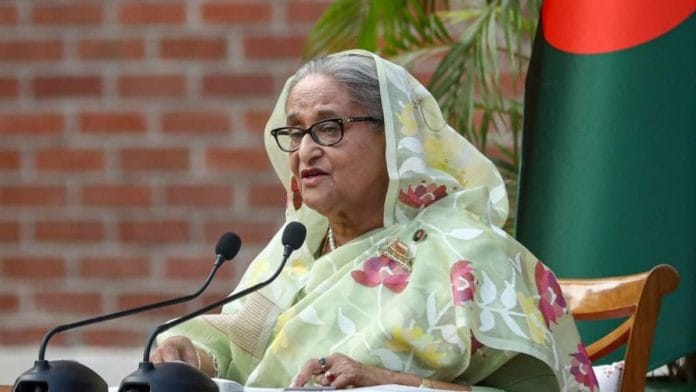New Delhi: India Monday remained non-committal to Dhaka’s reiteration of its request for Sheikh Hasina’s extradition soon after she was sentenced to death, though Bangladesh called the sheltering of the ousted ex-PM an “intolerant act and a disregard for justice”.
Hasina has been sentenced to death by hanging for crimes against humanity. The charges stem from her regime’s actions to suppress the student-led protests between June and August 2024. The protests eventually led to her ouster on 5 August 2024.
“In today’s verdict by the International Crimes Tribunal, absconding accused Sheikh Hasina and Asaduzzaman Khan Kamal have been convicted and sentenced for the Jallahi (executioner) murder. If any country gives shelter to these individuals convicted of crimes against humanity, it will be an extremely intolerant act and a disregard for justice,” the Bangladesh Ministry of Foreign Affairs said in a statement on the social media platform X.
The statement added: “We appeal to the Government of India to immediately hand over these two convicted individuals to the Bangladesh authorities. According to the extradition treaty existing between the two countries, this is also an obligatory duty for India.”
India’s first formal reaction, however, remained non-committal to Bangladesh’s request. In its statement India said that it is “committed to the best interests of the people of Bangladesh, including in peace, democracy, inclusion and stability in that country. We will always engage constructively with all stakeholders to that end.
The ICT (Bangladesh) announced Hasina’s death sentence, along with that of Kamal, the former home minister of Bangladesh, in the afternoon Monday. The verdict came after nearly five months of hearings.
A UN report estimates up to 1,400 deaths in the government clampdown on student protesters. The events culminated in Hasina’s fall on 5 August.
Both Hasina and Kamal were tried in absentia, as they had been living in exile. Hasina escaped to New Delhi after she had been ousted from office after 15 years in power in Bangladesh.
Bilateral ties
Ties between India and the interim government in Bangladesh—led by Nobel Laureate Muhammad Yunus—have been tense in the last 15 months. Prime Minister Narendra Modi met Yunus on the margins of the Bay of Bengal Initiative for Multi-Sectoral Technical and Economic Cooperation (BIMSTEC) summit in Bangkok, Thailand, in April 2025.
However, Yunus has not been invited to India so far. New Delhi-Dhaka relations have also seen back-and-forth actions, like trade restrictions and stricter customs checks on goods exported from India. Delhi has also restricted the import and transhipment of Bangladeshi goods via selected ports.
Despite the political tensions, several bilateral mechanisms are operational. Bangladesh’s National Security Adviser Khalilur Rahman will travel to New Delhi on 19-20 November for the Colombo Security Conclave. Rahman will interact with India’s NSA Ajit Doval.
Hasina’s continued stay in New Delhi remains a major challenge. Last week, Dhaka summoned India’s Deputy High Commissioner Pawan Badhe to protest the access Hasina has to the Indian media. This came after the ex-PM gave a raft of interviews to both domestic and foreign outlets.
India has maintained that Bangladesh’s interim administration must do more to protect the rights of minorities. The government has publicly condemned last year’s attacks on minorities. Hindus make up only eight percent of Bangladesh’s population. Meanwhile, India has also said that it supports a democratic and inclusive Bangladesh.
Yunus, on the other hand, has scheduled the Bangladesh elections for February 2026.
(Edited by Madhurita Goswami)







I am not a fan of sheikh hasina either but why would I listen to this government in Bangladesh ? Rather I would irritate them more and give more safe haven to dissenters of this regime.
This government in Bangladesh is an hostile entity and should be treated as one. We should hold our opinions until the elections happen over there and then take appropriate actions depending on the mood of that government.
I am not kidding when I say but I expect India to be more proactive if Bangladesh funds anti India terror groups. I expect the Pakistan treatment.